The Mainstream Phoenix Rises: Samsung's 970 EVO (500GB & 1TB) SSDs Reviewed
by Billy Tallis on April 24, 2018 10:00 AM ESTMixed Random Performance
Our test of mixed random reads and writes covers mixes varying from pure reads to pure writes at 10% increments. Each mix is tested for up to 1 minute or 32GB of data transferred. The test is conducted with a queue depth of 4, and is limited to a 64GB span of the drive. In between each mix, the drive is given idle time of up to one minute so that the overall duty cycle is 50%.
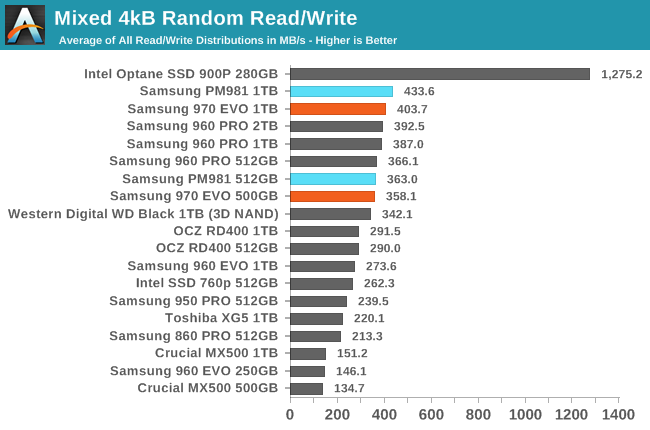
The Samsung 970 EVO is slightly slower than the OEM PM981 on the mixed random I/O test, but that still leaves the 1TB model very near the top of the chart, and the 500GB 970 EVO is only slightly behind the MLC-based 960 PRO.
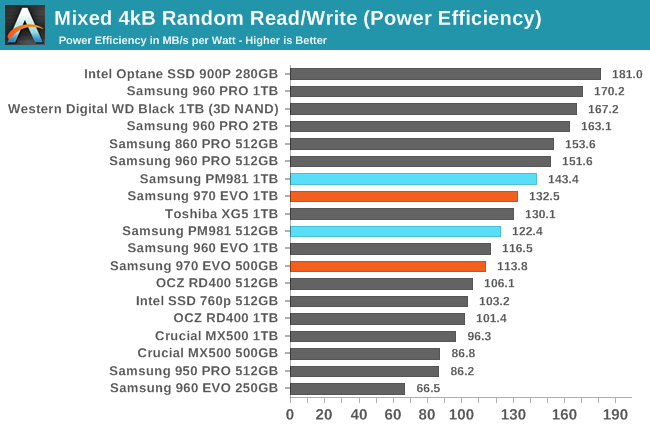 |
|||||||||
| Power Efficiency in MB/s/W | Average Power in W | ||||||||
The power efficiency of the Samsung 970 EVO trails the PM981 by a larger margin than performance alone did. The efficiency of the best MLC drives seems almost out of reach for TLC drives, except that the WD Black is in third place overall with 26% better efficiency than the 970 EVO.
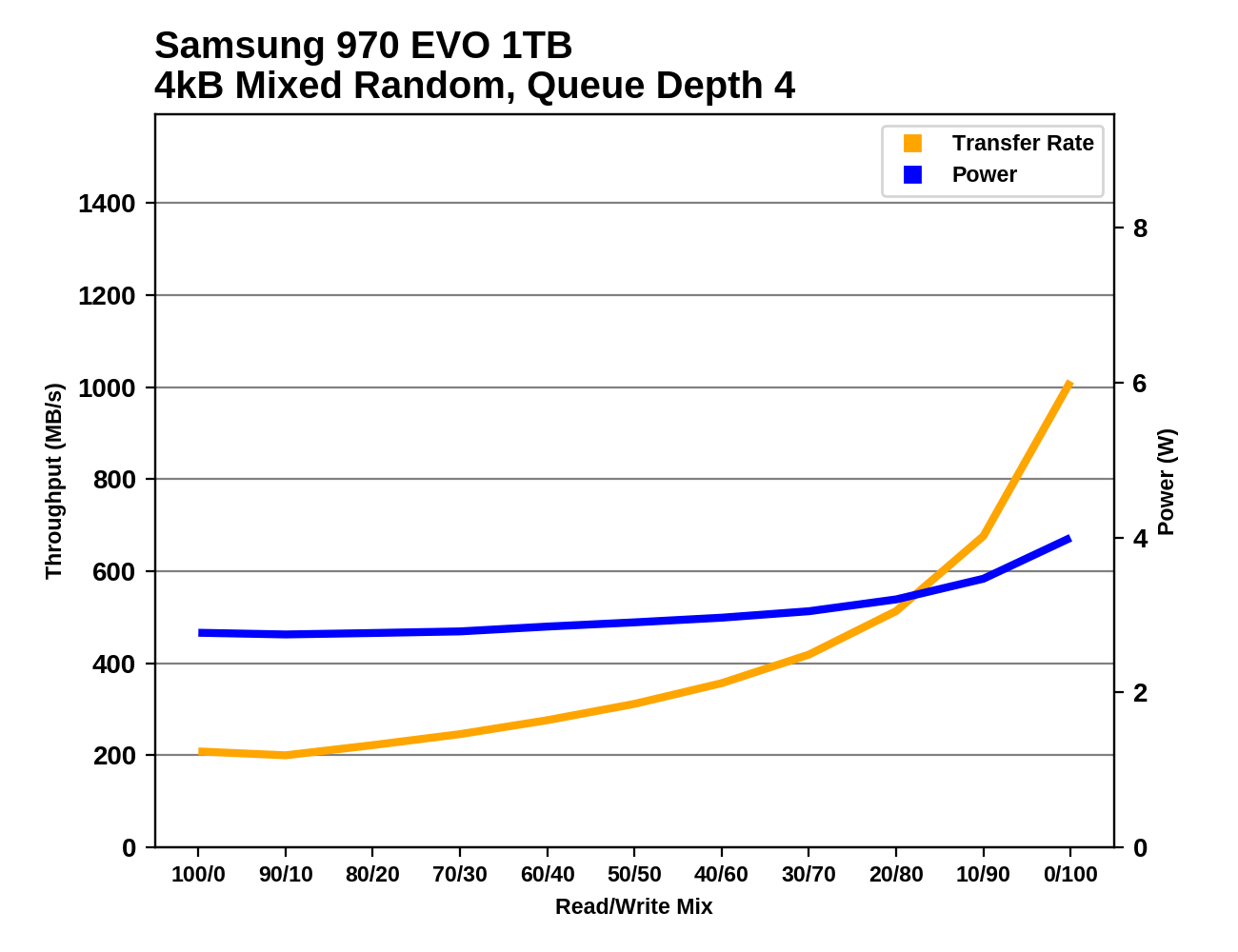 |
|||||||||
The Samsung 970 EVO's performance barely drops when writes are first added to the mix, and it grows at an accelerating rate through the rest of the test. The PM981 pulls ahead in the final phases with higher random write performance than the 970 EVO. The 960 EVO showed very flat performance until fairly late in the test, leaving it well behind the 970 EVO for overall performance despite offering similar performance at either end of the test.
Mixed Sequential Performance
Our test of mixed sequential reads and writes differs from the mixed random I/O test by performing 128kB sequential accesses rather than 4kB accesses at random locations, and the sequential test is conducted at queue depth 1. The range of mixes tested is the same, and the timing and limits on data transfers are also the same as above.
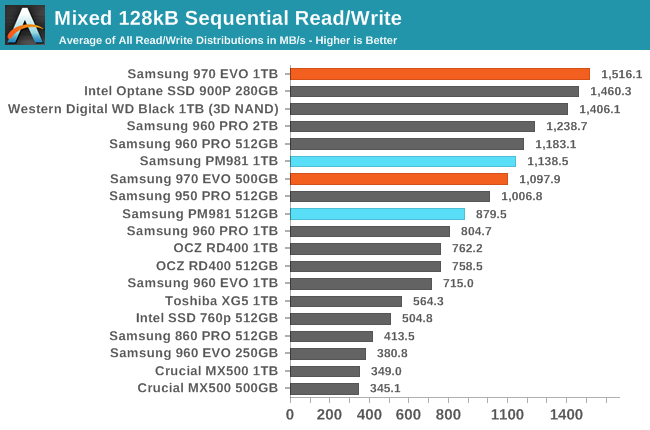
The Samsung 970 EVO sets new records on the mixed sequential I/O test, with the 1TB model beating the Intel Optane SSD and the WD Black. The 500GB model is significantly slower, but still performs well for its capacity. Both models are much faster than the PM981.
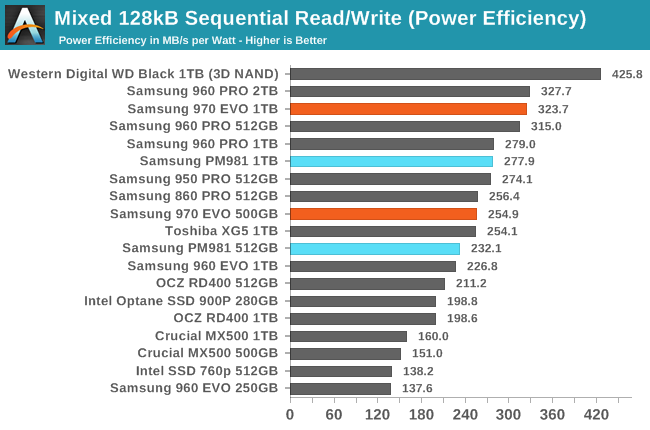 |
|||||||||
| Power Efficiency in MB/s/W | Average Power in W | ||||||||
The 1TB Samsung 970 EVO is essentially tied for second place in power efficiency on the mixed sequential I/O test, but the first place WD Black has a large lead. The improved performance of the 970 EVO over the PM981 is match by improved efficiency, but in absolute terms the 970 EVO is drawing more power than almost any flash-based SSD on this test.
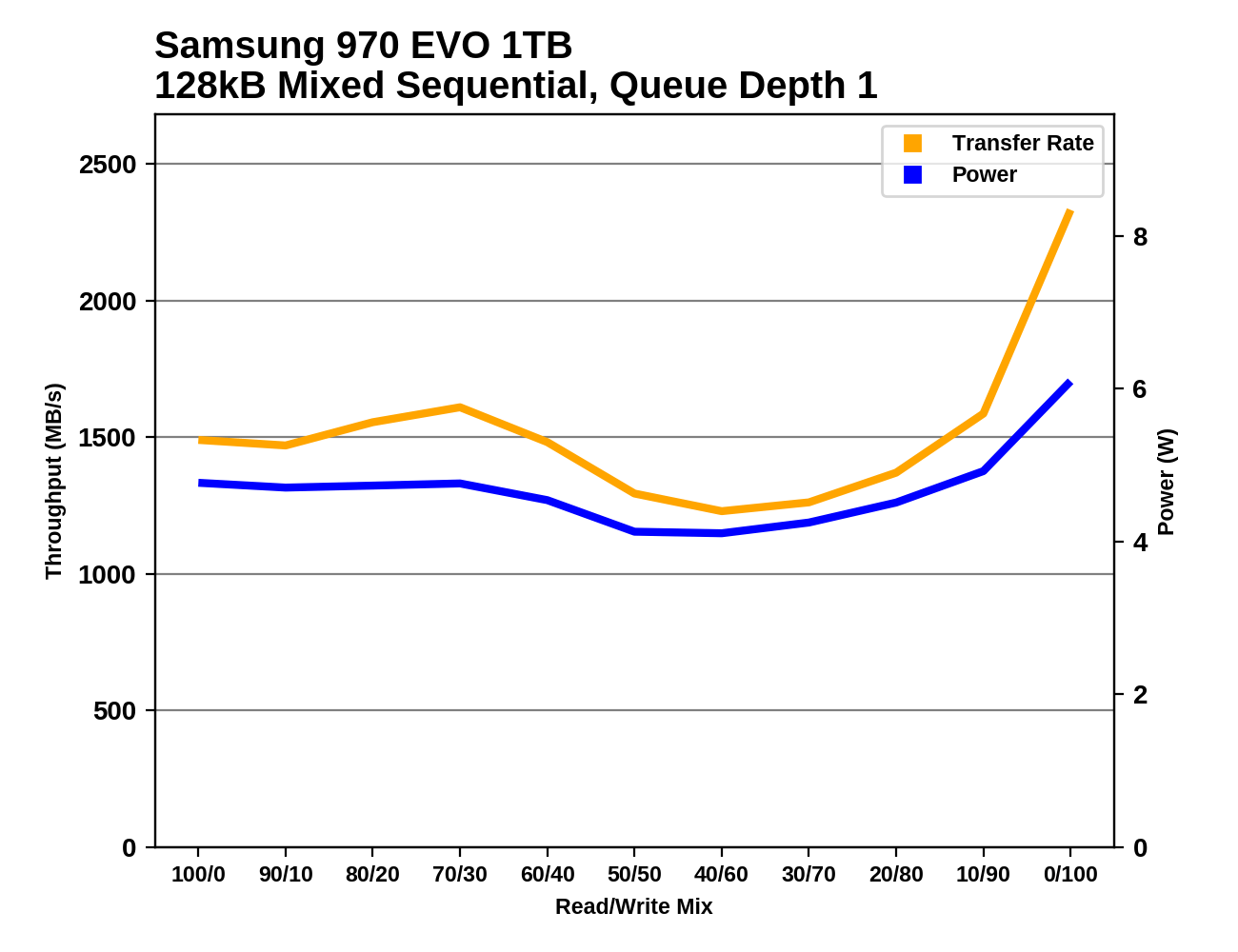 |
|||||||||
The performance of the Samsung 970 EVO on the mixed sequential I/O test wobbles around with an unusual pattern that mirrors that of the PM981 but little else. The 1TB 970 EVO shows the typical spike in performance at the end when the workload shifts to fully cacheable writes, but the test fulls the SLC write cache on the 500GB model and prevents it from getting that boost.










68 Comments
View All Comments
jjj - Wednesday, April 25, 2018 - link
The conclusion was shocking, nowadays when nobody has ethics and they just try to sell and sell and sell. What you did there is like telling people that a 500$ GPU is nuts and really, I have zero expectations for anyone to say something like that anymore. Today is all about manipulating people into being stupid and buying a politician or a product.You should make your own site, would be the only honest hardware review site on the planet. People are getting worse and worse in managing their money and parents, schools, the press are not doing anything about it.
Congrats and thanks, I've missed seeing some sanity in a review.
peevee - Monday, April 30, 2018 - link
Yep. Now if only they would start including any real-life test. Recoding a large video. Compilation of a software package. Decompressing a zip archive. I suspect they don't do it because they need to sell ads from large-margin manufacturers like Samsung.hansmuff - Wednesday, May 2, 2018 - link
If only you'd read the article properly and see what the Destroyer etc tests actually ARE.. they're explained in great detail. Follow the links. All of those things ARE IN THERE.Urbanos - Sunday, May 6, 2018 - link
Its annoying that your charts seem to have little consistency, from chart to chart one can't easily follow the comparison part for part. Older Anandtech articles never had this problem.mapesdhs - Sunday, May 6, 2018 - link
Billy, I think it would worth adding something in the article somewhere to explain why in several cases the 950 Pro still shows so strongly after all this time. I'm intrigued. I knew it could beat the 960 EVO, but even so, sometimes it's above the 970 and other unexpected newer models.Ian.
Stephan0711 - Thursday, May 10, 2018 - link
960 pro 512 TB or 970 evo 500TB for desktop use / gaming? What do you guys think?Which benchmark represents this kind of usage?
ETHANH - Friday, May 11, 2018 - link
My friend just got a 970 pro 1TB yesterday, after we tried it out. I like my HP EX920 better, similar performance, much cheaper prices.Abad - Saturday, May 19, 2018 - link
Hi Friends,My pocket allows for the 512GB only and I was waiting results from the 970 and the EX920 before I write this: Toshiba RD400 512GB is the one to go for. If you factor in: price, performance and warranty, its unbeatable. To see 2016 MLC technology competing with Q2 2018 tech and winning must ring bells. Its no rocket science. The RD400 uses the more expensive and faster MLC cells, but because it comes from 2016, it is selling same price as the cheaper and slower TLC cells used in today's SSDs. You can't have a safer bet, can you?
But then, I heard some talk that OCZ SSDs go south but even that wont deter me from going for the RD400. What do you think?